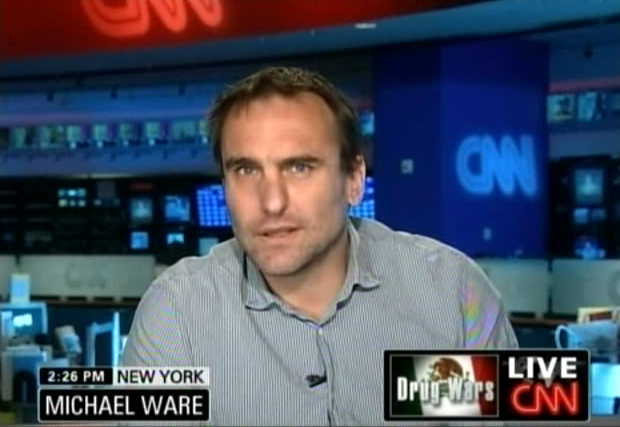NR: "...the government forces are simply not winning."
March 14, 2009

Length: 3:04
LARGE (42.9 MB) ----- SMALL (3.8 MB)
Michael speaks with Fredericka Whitfield about the cartel wars as a prelude to an hour-long discussion on the subject.
FREDERICKA WHITFIELD: Some very frightening statistics now. Juarez, Mexico averaged ten homicides a day in February. It's a hotbed of drug violence that has the Mexican government moving 5,000 soldiers into the town right now, across the border from El Paso. The U.S. could deploy troops to the border as well, but only as a last resort. That's according to a top Homeland Security official, testifying this week before a House panel.
The official says deadly violence from Mexican drug cartels is now the biggest organized crime threat to the US. CNN's Michael Ware has spent plenty of time in war zones and recently in Juarez. He's joining us right now from New York.
So Michael, this is bad. It's been bubbling up for quite some time now. Your visit to Juarez, you've seen it all. How eye-opening was it?
MICHAEL WARE, CNN CORRESPONDENT: Well, it really was quite startling for an outsider to visit. I mean, to go from the holy wars of the Middle East to the drug wars of Mexico -- indeed, right on the American border -- was truly a revelation. It's a very intense fight. And right now the government forces are simply not winning. And, indeed, the way this war is currently being waged, it cannot be won. In many ways, the drug wars have turned into an insurgency. The cartels there, all-powerful, have roughly 100,000 foot soldiers at their disposal.
WHITFIELD: The drug cartels do?
WARE: That's right. Meanwhile, you have local police, who are completely corrupted, federal police, who are similarly tainted. So the Mexican president for the past two years has sent about 50,000 soldiers into the streets. And it's still not working.
WHITFIELD: Underscoring that problem is not only do you have the drug trade that's gotten violent, but now, as we hear of federal authorities that are being asked to push toward the border to try to protect the United States side of the border -- we're also hearing that there's a lot more to the smuggling of weapons from the U.S. into Mexico. And that was kind of the center piece of your most recent pieces.
WARE: That's right. And this is a conflict in Mexico where already this year 1,000 people have died, 1,000 in a little over eight weeks. And in the border town of Juarez, which essentially is a sister city to El Paso, more than 450 have died in these first two months.
So militarizing the border is something. Trying to shut down these routes is something else. But because of two things -- one is the ongoing demand for illicit drugs in America, and then the supply of American weapons to the cartels, that's what's fueling this war.
WHITFIELD: Unbelievable. Michael Ware, thanks so much. You're going to join us again in the 4:00 p.m. Eastern hour, because there is so much to this story and how really it is bubbling up and affecting so many border towns.
